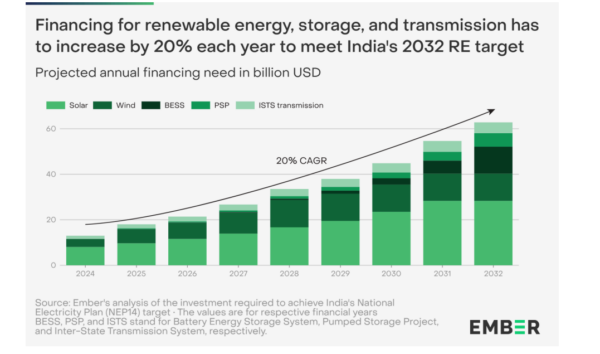India needs a total investment of $300 billion by 2032 to meet its renewable energy targets as per 14th National Electricity Plan (NEP-14). This means annual financing for renewable energy, storage and transmission must grow by 20% each year, reaching $68 billion by 2032 from $13.3 billion in FY 2024, according to a new report from Ember.
NEP-14 targets 596 GW of RE capacity by 2032. This would account for 68.4% of the country’s total installed capacity and meet 44% of its electricity demand. NEP-14 sets specific targets of 365 GW of solar, 122 GW of wind, 47 GW/236 GWh of battery energy storage system (BESS) and 26.7 GW of pumped storage plants (PSP). By Oct. 2024, the country had achieved 200 GW of RE capacity, with an additional 151 GW under various stages of development and construction.

The Ember report maps various financial risks associated with renewable projects. Based on the assessment of these risks, it estimates the premiums associated with these risks and the overall impact of the risks on the cost of capital .The report moves beyond traditional “thumb rules” for calculating risk premiums by adopting a data- and modeling-driven methodology instead. Project commissioning delays and risks associated with new-age Firm and Dispatchable Renewable Energy (FDRE) projects could together increase the cost of capital by up to 400 basis points.
Commissioning delays are caused by land acquisition bottlenecks, grid connectivity delays, and delays in power purchase agreement (PPA) signing. These delays have averaged 17 months, with projects in some cases extending even up to 26 months and beyond. Additionally, FDRE projects, designed to enhance renewable energy dispatchability, introduce unique financial risks. These risks are mainly attributed to penalties for not meeting the required demand fulfilment ratio (DFR) and exposure to wholesale market fluctuations. Excess electricity from FDRE projects—ranging from 25% to 45% of the contract requirement—is sold in the wholesale market, thus exposing developers to price volatility and potential price cannibalization.
Uncertainties around future battery replacement costs could also impact the financials of the project.
The analysis further suggests that a 400 basis points increase in financing costs could result in India falling short of its 500 GW renewable energy target by up to 100 GW. An elevated cost of capital would also increase the cost of electricity for consumers.
Neshwin Rodrigues, Senior Energy Analyst for India at Ember, emphasised the need for targeted mitigation measures: “Understanding project-specific financing risks for RE projects is key to designing targeted mitigation measures that keep the cost of capital low. Staying attuned to evolving risk profiles in renewables is essential for sustaining their growth and ensuring India meets its RE targets.”
Duttatreya Das, Energy Analyst for India at Ember, highlighted the value of structured risk assessment: “Besides offering a detailed assessment of key risks in India’s renewable markets, this report presents a transparent risk premium assessment methodology for renewables. By demystifying the quantification of risks and their magnitude, it ensures that all RE stakeholders—developers, financiers, and policymakers—have access to a structured framework for evaluating risks. This, in turn, can lead to more targeted policy interventions and contracting mechanisms that effectively mitigate risks, ultimately supporting the affordability of renewable energy. “
This content is protected by copyright and may not be reused. If you want to cooperate with us and would like to reuse some of our content, please contact: editors@pv-magazine.com.









By submitting this form you agree to pv magazine using your data for the purposes of publishing your comment.
Your personal data will only be disclosed or otherwise transmitted to third parties for the purposes of spam filtering or if this is necessary for technical maintenance of the website. Any other transfer to third parties will not take place unless this is justified on the basis of applicable data protection regulations or if pv magazine is legally obliged to do so.
You may revoke this consent at any time with effect for the future, in which case your personal data will be deleted immediately. Otherwise, your data will be deleted if pv magazine has processed your request or the purpose of data storage is fulfilled.
Further information on data privacy can be found in our Data Protection Policy.